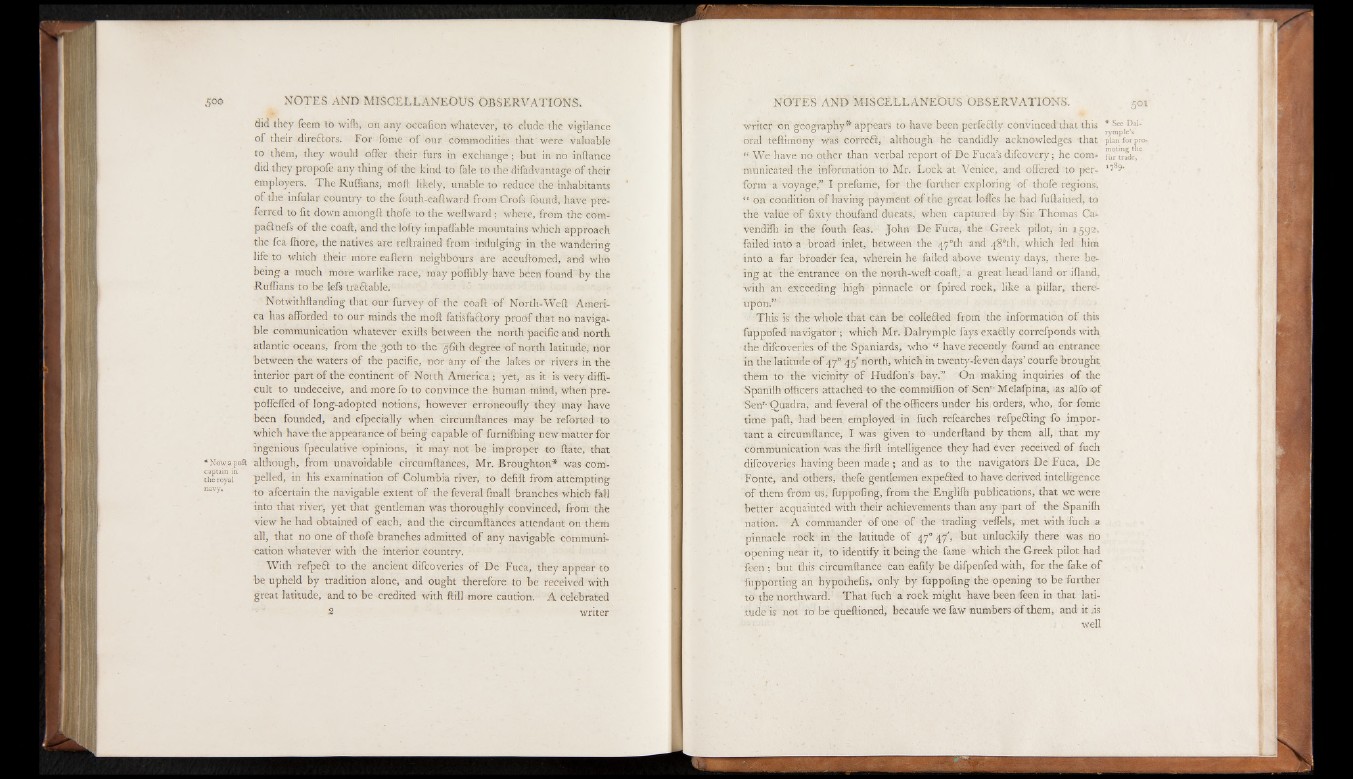
•No«
captai:
the ro;
na vy.
did they feem to wifh, on any occafion whatever, to elude the vigilance
of their direftors. For fome of our commodities that'were valuable
to them, they would offer their furs in exchange ; but in no inftance
did they propofe any thing of the kind to fale to the difadvantage of their
employers. The Ruffians, moll likely, unable to reduce the inhabitants
of the infular country to the fouth-eaft ward from Crofs found, have preferred
to fit down among!! thofe to the weftward ; where, from the conn
paftnefs of the coaft, and the lofty impaffable mountains which approach
the fea Ihore, the natives are reftrained from indulging in the wandering
life to which their more eaftern neighbours are accuftomed, and who
being a much more Warlike race, may pofiibly have been' found by the
Ruffians to be lefs tra&able.
Notwithftanding that our furvey of the coaft of North-Weft America
has afforded to our minds the moll fatisfaflory proof that no navigable
communication whatever exifts between the north pacific and north
atlantie oceans, from the 30th to the gSth degree o f north latitude, nor
between the waters of die pacific, nor any of the lakes or rivers in the
interior part of the continent o f North America t yet, as it is very difficult
to undeceive, and more fo to convince the human mind, when pre'-
poffeffed of long-adopted notions, however erroneoufly they may have
been founded, and efpecially when circumftances may be retorted to
which have the appearance o f being capable of furnilhing new matter for
ingenious fpeculative opinions, it may not be improper to ftate, that
r a p o ft although, from unavoidable circumftances, Mr. Broughton* was com-
yai pelled, in his examination of Columbia river, to defift from attempting
to afeertain the navigable extent of the feveral fmall branches; which-fell
into that river, yet that gentleman was thoroughly convinced, from the
view he had obtained of each, and the circumftances attendant on them
all, that no one of thofe branches admitted of any navigable communication
whatever with the interior country.
With refpeft to the ancient difeoveries of De Fuca, they ap-pCat to
be upheld by tradition alone, and ought therefore to be received with
great latitude, and to be credited with ftill more caution. A celebrated
2 writer
writer on geography* appears to have' been perfeftly convinced that this * See Dal-
oral teftimony was correft, although he candidly acknowledges that pUnforpro-
“ We have no other than verbal report o f De Fuca’s difeovery; he com- Iwtrfdc,'
munieated the information to Mr. Lock at Venice, and offered to per- 1,S9- .
form a voyage,” I prefume, for the further exploring o f thofe regions,
“ on condition of having payment of the great Ioffes he had fuftained, to
the value of fixty thoufand ducats, when captured by Sir Thomas Ca-
vendifti in the fouth feas. John De Fuca, the Greek pilot, in 1592,
failed into a broad inlet, between the 47°th and 4'8°th, which led him
into a far broader fea, wherein he failed above twenty days, there being
at the entrance on the north-weft coaft, a great head land or ifland,
with an exceeding high pinnacle or fpired rock, like a pillar, thereupon.”
This is the whole that can be colle&ed from the information of this
fuppofed navigator ; which Mr. Dalrymple fays exafilly correfponds with
the difeoveries of the Spaniards, who ‘‘ have recently found an entrance
in the latitude of 47*’ 45' north, which in twenty-feven days’ courfe brought
them to the vicinity of Hudfon’s bay.” On making inquiries of the
Spanilh -officers attached to the commiffion of Sen'-Melafpina, as alfo o f
'Serf- Ouadra, and feveral o f the officers under his orders, who, for fome
time pall, had been employed in fu-ch refearches refpeEling fo important
a circumftarice, I was given to underftand by them all, that my
communication was the firft intelligence they had ever received of fuch
difeoveries having been made ; and as to the navigators De Fuca, De
Fonte, and others,- thefe gentlemen expefied to have derived intelligence
of them from us, fii-ppofing, from the Englilh publications, that we were
better acquainted with their achievements than any part of the Spanilh
nation. A commander of one of the trading veffels, met with fuch a
pinnacle rock in the latitude of 47° 47', but unluckily there was no
opening near it, to identify it being the fame which the Greek pilot had
feen ; but this circumftance can eafily be difpenfed with, for the fake of
fupporting an hypothefis, only by fuppofing the opening to be further
to the northward. That fuch a rock might have been feen in that latitude
is not to be queftioned, becaufe we faw numbers of them, and it .is
well